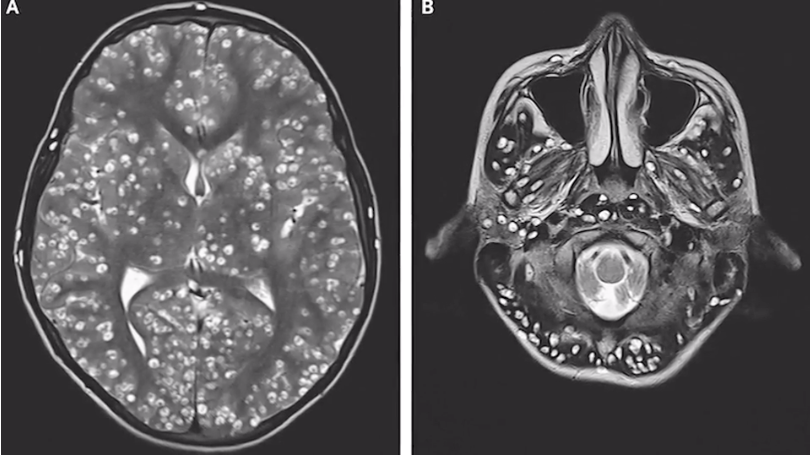
An 18-year-old boy has died after an X-ray revealed parasitic cysts nestled in his brain. The boy from India quickly felt something was wrong after complaining about pain in his groin. He also started experiencing intense seizures that caused him to lose consciousness and have violent muscle contractions. It was only when doctors performed the scan that they realized he had unknowingly ingested eggs from a tapeworm, which then traveled up his body and infected his brain.
The boy started showing symptoms only weeks ago, when he appeared to be confused during an examination and had swelling over his right eye.
The boy — who has yet to be identified — was brought into the hospital by his parents, according to the New England Journal of Medicine, They reportedly told doctors he had been experiencing unusual symptoms. These included suffering from generalized tonic-clonic seizures, an episode in which the person loses consciousness as the seizure starts. The person's muscles contract and jerk violently for the one to five minutes the seizure lasts.
He also had swelling over his right eye, and his parents told doctors that he had been experiencing pain in his groin for a week. After being examined by medical staff, it appeared the boy was confused; he also had tenderness in his right testis.
Doctors quickly decided to do an MRI scan and discovered something was seriously wrong.
The MRI scan revealed the disturbing truth. The teen had "well-defined cystic lesions" throughout his cerebral cortex, brain stem, and cerebellum. He also had cysts above his right eye and testis. He was diagnosed with neurocysticercosis — a condition that occurs when a person ingests microscopic eggs from a pork tapeworm (Taenia solium) from infected pork that's undercooked. "If the tapeworm's eggs hatch in a person's intestine, the larvae can travel throughout the individual's body, including to the brain, where they form cysts, resulting in neurocysticercosis," Live Science reports.
CBS News reported that this type of tapeworm is more common in developing nations, such as Latin America, Africa, or Asia, and neurocysticercosis is one of the most common forms of seizures across the world.
Unfortunately for the teen, neurocysticercosis can be fatal and his case was particularly severe.
Because there were so many cysts and because of their locations, doctors decided against using antiparasitic medications to treat the teen. They feared the medications would cause brain bleeding and inflammation and could possibly result in a loss of vision, which is why they chose to treat him with an anti-inflammatory drug, dexamethasone, and anti-epileptic medications.
WMUR reported that patients who have cysticercosis, parasitic invasions of the human body, occur worldwide, but the tapeworms cannot be spread from person to person.
Unfortunately, the treatment couldn't save the boy's life. Two weeks later, the 18-year-old died.




